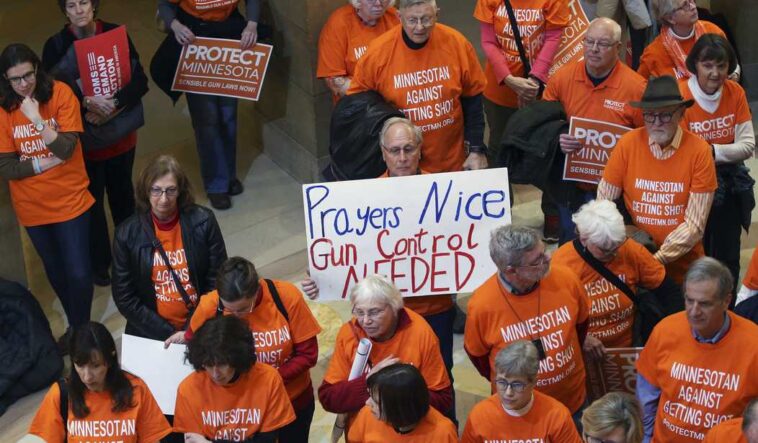Whether you like it or not, you have someone in your life who supports gun control. They might not have gone full Shannon Watts or anything, but they really do want some restrictions on the right to keep and bear arms well beyond anything any of us might consider constitutional.
And thanks to social media, too few seem to be able to keep their anti-gun views to themselves. That has spilled over into face-to-face discussions whereas they might not have in days gone by.
But over at America’s First Freedom, Charles C.W. Cooke has a piece that is basically a breakdown of what most discussions with gun control advocates look like.
Here are some highlights:
They often begin with someting like: “Charles, we have to do something about guns.”
“Okay, I’m listening,” I respond. “What do you want to do?”
I want common-sense gun control.
Such as?
Well, we could start by accepting that the Second Amendment doesn’t even protect the right to keep and bear arms. That idea was made up by Antonin Scalia in 2008.
Ah. I’m afraid that you’ve fallen here for a debunked conspiracy theory. In truth, the right to keep and bear arms has been a part of American life since the 17th century. It was respected in colonial America—and in many colonial and state constitutions—long before the Constitution was written; it was acknowledged and reaffirmed by every major legal scholar of the 18th and 19th centuries; it was explicitly extended to all Americans by the drafters of the 1866 Civil Rights Act, the two postbellum Freedmens Bureau Acts, and the 14th Amendment; and it was accepted by 80% of the American public prior to the Supreme Court’s decision in Heller. The U.S. Bill of Rights protects individual liberties; there is no such thing as a “collective right” in that document. The right, as the Second Amendment makes clear, is “of the people.”
Fine. But it’s an amendment. It was, itself, a change. Doesn’t that tell you something? It, too, could be amended.
Not really. The Second Amendment is, indeed, an “amendment” to the original Constitution, albeit one that was added only two years after the Constitution went into effect. But, contrary to your implication, it wasn’t the result of shifting political attitudes or of a debate over policy, but of a desire to make sure that Americans’ fundamental liberties were clearly protected. When James Madison introduced the proposed U.S. Bill of Rights into Congress, he made it clear that he had included only those provisions that were entirely uncontroversial. As a historical matter, the term “amendment” is a misnomer when applied to the first 10 changes. They are more accurately described as the price of admission for the ratification of the Constitution, as that was the agreement at the time.
This often goes along with “The Bill of Rights isn’t a suicide pact!”
No, it’s not, but the truth is that the Second Amendment won’t lead us to suicide, so it’s not remotely applicable. The vast majority of homicides are committed with firearms that were illegally obtained, meaning gun control didn’t work. These are laws that few are interested in changing, either, so you can’t even blame the NRA for that.
Then we get into the idea that the Second Amendment is meant to deter tyranny, where Cooke argues:
Ha! So you think that if America became a tyranny, the people could fight back with small arms?
Yes, I do think that. And, perhaps more importantly, I think that America would have no chance of becoming a tyranny while the people remain well-armed. But I must ask you: Can you hear yourself? You’re positing the possibility that the United States would become a tyranny while worrying about the citizenry being armed. What, in the last three centuries of human history, has given you the idea that the problem to be solved is that free people have arms?
Crime has given me that idea. Criminals use guns! We have to stop that.
How?
By banning guns!
By banning guns for whom?
Honestly, it goes on for a bit and you should go and read it. You should probably bookmark it then refer back to it whenever you find yourself in such a discussion. You can do that because yes, these debates boil down to the same thing over and over again.
And yes, eventually they’ll have to acknowledge that they want to ban guns.
See, anti-gunners will routinely deny that they want to do any such thing, but they can never really tell you where the line is for what they support and what they don’t short of a total gun ban. Well, no nation has completely and totally banned guns. There’s always a way someone can get a gun, at least in theory. The elites want to protect their access to firearms, after all, so there’s always a path.
it’s just out of reach for most people.
But when you press gun control advocates on where the line is, they never seem to be able to give you a real one. They have this idea that we can create laws where people will have the guns they need and absolutely nothing more but that the criminals simply can’t obtain them, like the gun will shock them if they try to pick it up or something.
It’s kind of insane, really.
There were a few favorites of the anti-gunners that Cooke missed, but probably because he’s assuming a discussion among friends. I know I’ve been accused of actually supporting mass murder, despite having actually lost someone I cared about in one. I’ve been told that I actually want to see dead children in schools despite having one remaining school-aged child. That’s just to name a couple off the top of my head.
But for the most part, the discussion tends to follow a pretty set formula, one we should all know by heart. The only reason the “debate” doesn’t get to the end of Cooke’s piece is because a lot of them give up in frustration well before then.
Still, it’s amusing to read and remember.


